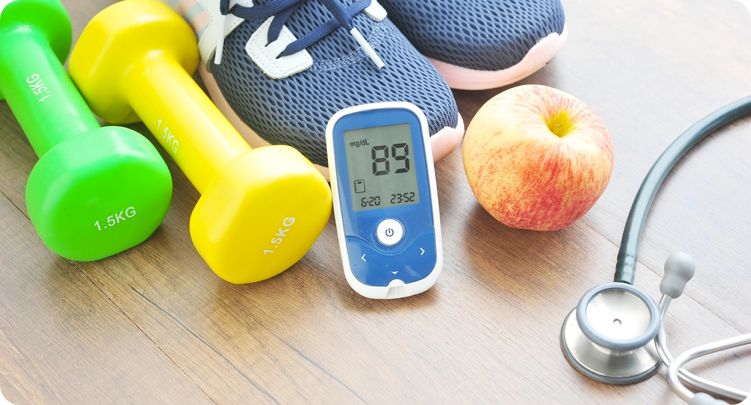Taking Control of Your Type 2 Diabetes
- Jun 2, 2022, 11:27 PM

Approximately 1.5 million Americans are diagnosed with diabetes each year. Currently about 1 in 10 Americans have diabetes and approximately 95% of them have type 2 diabetes. Traditionally this disease develops in people after the age of 45 but we are seeing more and more young adults and even children developing type 2 diabetes. If you have been diagnosed with type 2 diabetes there is a lot that you can do to improve your health. The best place to start is by making changes to your lifestyle. If you feel that you are ready to make positive changes to help control diabetes, here are some tips to get started:
Know the facts. It is important to understand what diabetes is and what it can do to your body. Diabetes is a disease that results in too much sugar in the blood (high blood glucose). The hormone insulin helps control the amount of sugar (glucose) in the blood by working like a key that opens the cells so sugar can enter and be used for metabolism. When the production of insulin is not enough or when the body’s cells don’t respond normally to insulin (insulin resistance), glucose can’t enter the cells as easily and builds up in the blood. High blood glucose over time damages the inside of blood vessels leading to many complications such as strokes, vision loss, heart attack, kidney damage and nerve damage. Diabetes is linked to some types of cancer and high blood glucose increases the chance of developing dementia.
Common risk factors for type 2 diabetes include being overweight, physically inactive, having high blood pressure, low HDL cholesterol and/or high triglycerides, or having had diabetes during pregnancy. Type 2 diabetes is a preventable chronic disease. The best way to prevent the onset of diabetes is by adopting a healthy lifestyle including a healthy diet, exercise and maintaining a healthy weight. Although it may run in your family, it does not have to be inevitable for you.
Visit your doctor regularly. Every person with diabetes needs to visit their doctor regularly. These regular check ups allow your doctor to monitor your condition and adjust your treatment plan as necessary. They also monitor you for complications due to diabetes.
Develop a healthy eating plan. Focus on a whole food based Mediterranean diet. Whole, plant-based foods are an important source of fiber and phytonutrients. Assure adequate quality protein which is necessary to repair cells and make new ones, support muscle growth, and stabilize blood sugar and insulin levels. This will also help to control hunger. Choose foods that are high in fiber, low in simple sugars and balance meals and snacks with quality fats and protein. Plan to eat throughout the day at regular intervals to stabilize blood sugar levels. A study in the American Journal of Clinical Nutrition found that starting your day with a low-carb, high protein breakfast had a positive impact on blood sugar levels throughout the day. Replace the typical Western breakfast of cereal and toast for a protein rich smoothie or a meal such as eggs, veggies, avocado and turkey sausage.
Increase physical activity. Exercise is the best way to improve insulin resistance. Make physical activity a part of your daily routine. A minimum of 30 minutes of daily exercise promotes insulin sensitivity which means the blood glucose can enter the cells more easily. Think of exercises such as brisk walking, swimming and bike riding. Including strength training sessions a few times per week can also help keep blood sugar levels steady. Following a healthy diet and increasing activity can help you to reach or maintain a healthy weight which is very important. Shedding excess pounds can help improve blood sugar levels. The power to start changing your health is in your hands, even small changes make a difference in managing your diabetes.
Manage stress. Stress hormones can increase your blood pressure, raise your heart rate, increase insulin resistance and inflammation and cause your blood sugar to rise. There are many things you can do to reduce stress. These include exercise, relaxation techniques such as deep breathing, prayer and meditation, yoga, laughter, support groups, enjoying hobbies and spending time with family and friends.
Get adequate sleep. Healthy sleep habits promote insulin sensitivity. It is important to go to bed at the same time every night and establish a sleep schedule that allows 7 to 8 hours of sleep. Avoid blue light which affects melatonin production by turning off all your screens one or two hours before bed. Have an evening routine that promotes relaxation before sleep.
Checking blood glucose levels is important. Your doctor will tell you how often your sugars should be checked. A blood glucose meter will show you how much glucose is in your blood at any moment. Talk with your healthcare provider for the best target range for you.
Take an active role in your care and work closely with your doctor as you practice the healthy habits your healthcare provider recommends.
Diane Duvall, Life Coach and Certified Health Coach for the Lifestyle Medicine Practice of Dr. Geni Abraham, Board Certified, American Board of Internal Medicine. Our Internal Medicine Practice is an integrated medical practice with a focus on Lifestyle Medicine. We offer health coaching sessions to help you reach your personal goals. Dr. Geni Abraham, Medical Specialists of the Palm Beaches, Inc., 205 JFK Drive, Atlantis FL 33462.
Phone: (561) 432-8935, Visit DrGeniAbraham.com and Follow us on Facebook
